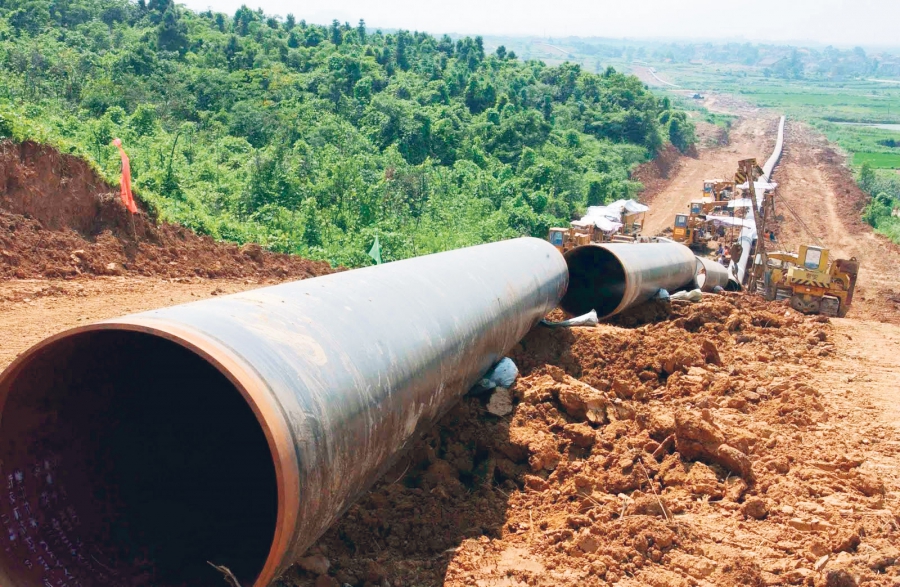Albania’s economy has being given a boost, thanks in part to the construction of the Southern Gas Corridor mega-pipeline project that will pump Azerbaijani gas from beneath the Caspian Sea into Europe.
In a report issued earlier this month, the Paris-based credit insurer COFACE listed foreign investments, in particular those related to energy, as the primary driver behind cash inflows into an economy with a gross domestic product (GDP) of about $13 billion.
“Growth is expected to remain [in Albania] high in 2018,” reads the report. “It will continue to benefit from continued foreign investment in infrastructure, especially in energy, with the ongoing construction of the Trans Adriatic Pipeline (TAP) transporting gas from Azerbaijan to Italy, and of the second plant (Moglice) of the Devoll river hydroelectric complex,” it continued, referring to a project that is expected to be completed sometime this year.
TAP is one of the three segments that comprise the Southern Gas Corridor and cuts clear across Albania from east to west, entering the country through Greece and exiting on the Adriatic coast before continuing westwards to southern Italy. It has been under construction since 2016 and is expected to be completed by the end of 2018.
The Southern Gas Corridor measures 3,500 km (2,175 mi) in length and, besides, TAP, also consists of the South Caucasus Pipeline, which runs through Azerbaijan and Georgia before connecting to the Trans-Anatolian Pipeline (TANAP), which cuts through Turkey horizontally and connects to TAP at the Greek boarder.
The corridor will draw from Azerbaijan’s Shah Deniz natural gas field, although discussions are in the works for Turkmenistan, located on the eastern shore of the Caspian Sea, to export some of its gas through what would be an expanded version of the gas behemoth.
According to a 2013 report by Oxford Economics, the construction of TAP was expected to create 2,900 jobs per year in Albania.
“The direct impact of the project is projected to peak in 2017, at which point activity is expected to generate €57 million ($71 million) for Albanian GDP and create 4,200 jobs (part-time and full-time),” read the report, which was issued in 2013.
“In total, the construction phase of the project is forecast to generate €157 million in GDP and support 2,900 jobs (part-time and full-time) per year.”
In August, Standard & Poor’s credit rating agency affirmed its 'B+/B' long- and short-term foreign and local currency sovereign credit ratings for Albania, considered one of the poorest economies in Europe. S&P forecasted an overage 3.8 percent annual economic growth from 2017 to 2020.
“Growth will primarily stem from strong domestic demand, with rising consumption and private investment, in our view. Economic development in 2017 will also benefit from two large investment projects in the energy sector, for which most of the construction will occur this year,” read S&P’s assessment as reported by SeeNews.
$1.8 billion has been invested in the construction of TAP. The realization of the project is said to have also improved the country’s infrastructure, including roads.







 The number of evacuees from flooded areas in Kazakhstan has reached 97,852 people, including about 32,856 children since March 27.
The number of evacuees from flooded areas in Kazakhstan has reached 97,852 people, including about 32,856 children since March 27.
 The Islamic holy month of fasting, Ramadan comes to an end this week with the celebration of a joyous festival called Eid (meaning “festival” in Ar...
The Islamic holy month of fasting, Ramadan comes to an end this week with the celebration of a joyous festival called Eid (meaning “festival” in Ar...
 Iran's senior military leaders described the drone and missile attack on Israel on April 14 night as “successful".
Iran's senior military leaders described the drone and missile attack on Israel on April 14 night as “successful".
 Iranian President Ebrahim Raisi warned Israel that it would face a "real and extensive" response if it makes any "mistake" following Tehran’s missi...
Iranian President Ebrahim Raisi warned Israel that it would face a "real and extensive" response if it makes any "mistake" following Tehran’s missi...



